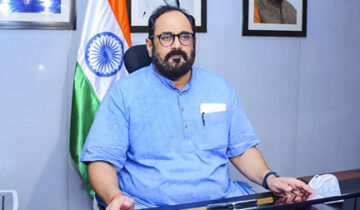
The government of India has put the Ministry of Electronics and Information Technology (MeitY) in charge of online gaming. The Ministry of Youth Affairs and Sports has been named to oversee eSports, such as Electronic Arts Inc.’s FIFA Soccer and Mobile Premier League.
The government has also proposed that the online gaming industry regulate itself through the creation of a self-regulatory body.
MeitY Minister Rajeev Chandrasekhar announced that the ministry would begin releasing rules and guidelines for online gaming and would soon hold a consultation with the public after that.
The rules could be revised after that process is completed.
It began by publishing proposed rules governing apps or websites where there is an exchange of users’ money, such as online casinos, card games and fantasy sports.
A seven-member ministerial task force began work on the rules in May. It also recommended MeitY as the governmental agency that should implement them.
Games of chance and online gambling are not covered under these rules. Concentrating all online gaming under one agency is seen as necessary because most legal issues dealing with them are based on Entry 34 of the State list of the Constitution, which governs gambling and wagering. It will also give consumers and operators a central location to address their concerns.
It also puts up a wall between online gaming and online gambling and prevents states from going after skill-based games under the pretext of regulating gambling. In the past, some states that outlaw gambling have sought to forbid online games as well. The goal is to prevent the industry being hobbled by a crazy quilt of competing regulations.
Online gaming is expected to more than triple in numbers between now and 2026, to an estimated $7 billion annually. The country has more than 400 online game start-ups, and an estimated 360 million players.
This has caused concerns among those who point to rising levels of addiction, which can lead to financial ruin, and in some cases, suicide.
In the last three years the Indian state of Tamil Nadu has reported 17 suicides that it attributes to online gaming. This prompted the state in October to pass a law that prohibits online gambling and regulates online gaming.
Meanwhile the government has adopted a draft amendment that requires the online gaming sector to regulate itself to a degree, especially in adopting policies that fight addiction and encourage social responsibility.
It would require that such a body register with the government, and that its board include a person nominated by the government with experience in public policy, public administration, law enforcement or public finance and another member taken from the fields of psychology, medicine or consumer education.
Gaming companies would also be required to appoint a chief compliance officer to ensure the companies are obeying the law and to verify user IDs before setting up accounts.
All India Gaming Federation CEO Roland Landers told Reuters: “We believe this is a great first step for comprehensive regulation for online gaming and will hopefully reduce the state-wise regulatory fragmentation that was a big challenge for the industry.”



